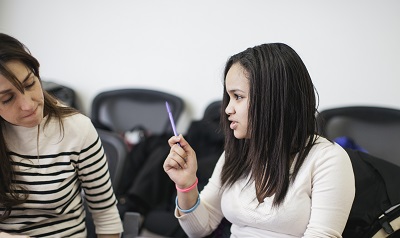It’s not easy being 17. At Sanctuary, we’re working to help teens navigate negative messages and achieve healthy relationships.
This is the second part of a two-part interview. Read part one.
At Sanctuary, I have the opportunity to work with teens like Lena to counteract messages about unhealthy relationships and “break the cycle” of domestic violence.
The Children and Youth Services Program staff offer a range of services specifically designed to meet the needs of teens – from individual counseling, to educational support, leadership workshops, and even a comprehensive Afterschool Enrichment Program that operates three days per week.
During counseling sessions with Lena, we spent a lot of time talking about what kind of things she would want in a relationship, what she felt she needed from a supportive partner. We talked about different aspects of the unhealthy and abusive relationship she had witnessed between her parents, and what the alternatives were for a healthy relationship.
I never tell a teen I’m working with what to do – that doesn’t work. I want teens to really think about these things on their own, with my help, so that they can figure out what they want in their lives and what they want out of a loving relationship.
I help them understand that because they saw violence growing up doesn’t necessarily mean it is normal or okay, but instead that there are all different ways to have a relationship and to communicate effectively what you want and how you feel.
The biggest challenge I face is working with teens families who have so many competing needs. Most of the families I work with have really concrete issues that need to be addressed, due to financial struggles, and due to systems that continue to oppress the teen and their family (including the public benefits system, education system, court system, or just racism/classism/sexism in general).
When my clients are returning to chaotic and violent neighborhoods and homes, it’s hard to help them focus during a counseling session on discussing their feelings.
That said, working with teens is amazing. I’ve worked with teens and young people from 12-25 years of age from all over the world and various educational, socio-economic, religious, and ethnic/racial backgrounds and I have learned something from all of them.
One thing I’ve learned, is that teens can tell when you’re being fake or just trying to placate them – if you’re honest with them, they will be honest with you. It’s a great feeling to get to know a teen, have them share things with you about their lives, and then help them figure out what they want for themselves and how to achieve it.
For Lena, talking through practical examples of healthy versus not healthy relationships was huge. She started thinking that healthy relationships were impossible, but eventually saw they were possible and that she deserved to have healthy relationships in the future.
The power of providing services to teens is that I can intervene at a really critical time in a teen’s life, and empower a teen like Lena to create a really different, healthy and fulfilling future for herself.
Andrea Yeriazarian has been working with kids and teens since she became a social worker 11 years ago. Andrea has spent 9 of those years with Sanctuary’s Children’s and Youth Services Program, and has been a leader in shaping the agency’s services for teens.
View all of our Domestic Violence Awareness Month blog posts and awareness-raising efforts!
